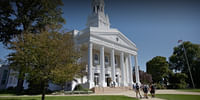$70,101/Yr
$70,101 /Yr
How We Study Economics
Important Dates
| Event | End Date |
| Early Decision Application Deadline Round 1 | Nov 1, 2023 |
| Early Decision Application Deadline Round 2 | Jan 1, 2024 |
| Regular Decision Application Deadline | Jan 8, 2024 |
Fees & Funding
Tution & Application Fees
| Year | Year 1 | Year 2 | Year 3 | Year 4 |
| Tuition Fees | $64000 | $64000 | $64000 | $64000 |
| Health Insurance | $4051 | $4051 | $4051 | $4051 |
| Books and supply | $800 | $800 | $800 | $800 |
| Miscellaneous expenses | $1250 | $1250 | $1250 | $1250 |
| Total Fees | $70101 | $70101 | $70101 | $70101 |
Eligibility & Entry Requirement
Academic Requirements:
- Submit official transcripts, diploma and external examinations of high school and other education completed
- Submit three letters of recommendation (two from teacher and one from guidance counselor)
- Submit teacher evaluation form
- Submitting SAT/ACT score is optional
- Submit English Language Proficiency test scores
Ask your question
Similar Colleges You Might Be Interested In
- Similar Colleges
No Ratings Found!!
Follow
No Ratings Found!!
Follow
No Ratings Found!!
Follow
No Ratings Found!!
Follow
No Ratings Found!!
Follow
No Ratings Found!!
Follow
No Ratings Found!!
Follow
No Ratings Found!!
Follow
No Ratings Found!!
Follow













.jpeg?tr=h-40,w-40,c-force)

